Table of Contents
ToggleThis is the ultimate guide to soba – Japanese buckwheat noodles in 2023.
Today I’m going to share everything you need to know about soba.
Including – how to make them at home!
So if you’re looking to improve your knowledge of Japanese cuisine or one of the simplest methods of making them, you’ll love this comprehensive guide.
The best Japanese noodles of your life?

As you may know, soba is a traditional Japanese noodle that is made from buckwheat.
In Japan, soba is traditionally used in many different noodle dishes all year round.
And they might just be the best Japanese noodles of your life.
Why?
I’ll share with you in just a bit.
If you’ve yet to try them in their traditional dishes, you might want to give them a try after reading this guide.
If I can’t convince you, they’re actually quite versatile in other non-Japanese dishes too – with their long length and firm texture, robust flavor and super slurp-ability.
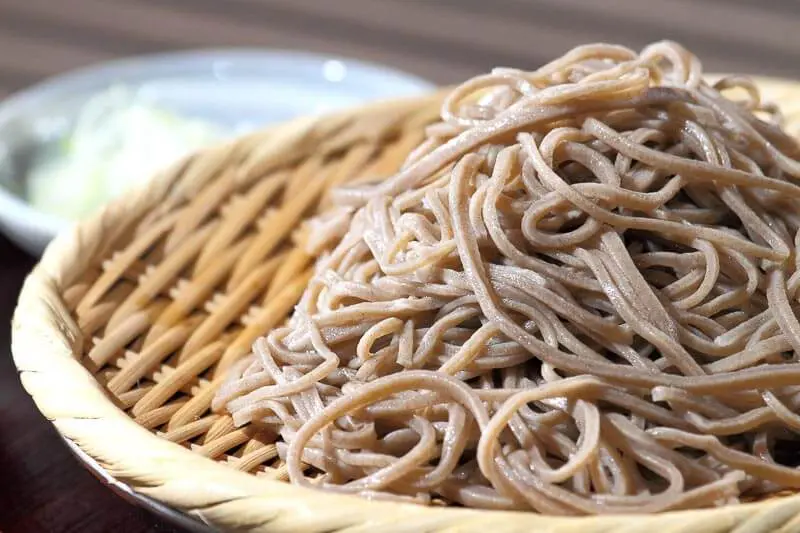
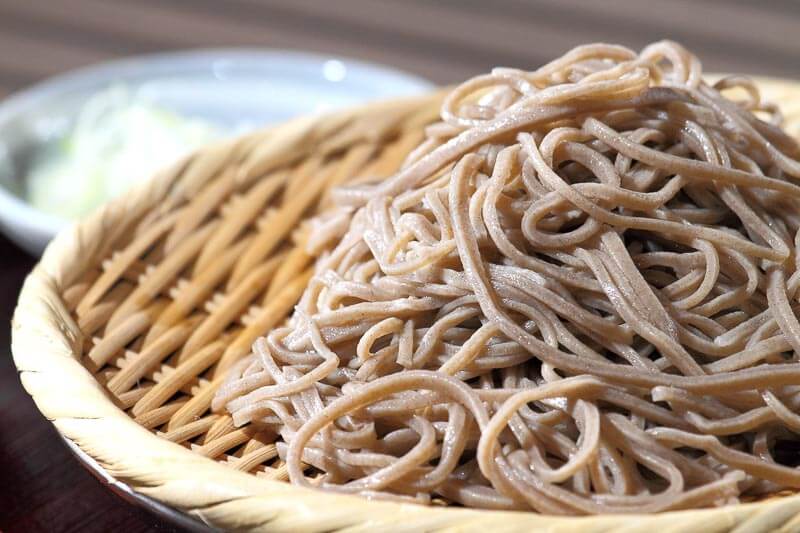
What you need to know about soba
Soba noodles are probably one of the healthiest foods you could ever eat.
That is…
when you make them with mostly buckwheat.
Buckwheat is full of protein, fiber, minerals and micronutrients that give wheat a run for it’s money.
Plus it tastes good too.
concerned about wheat or have gluten-intolerance?
you’re in luck!
buckwheat contains no gluten.
buckwheat is a different plant from wheat.
And if you’re set on being gluten free, this could be a new option to add to your rotation.
Ju-wari (十割)is the term that indicates soba noodles are made with 100% buckwheat.
Not all soba noodles are created equal, but Juwari is what you want if you’re seeking gluten free.
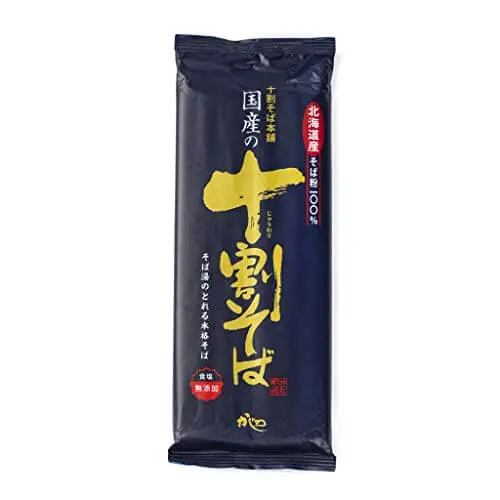
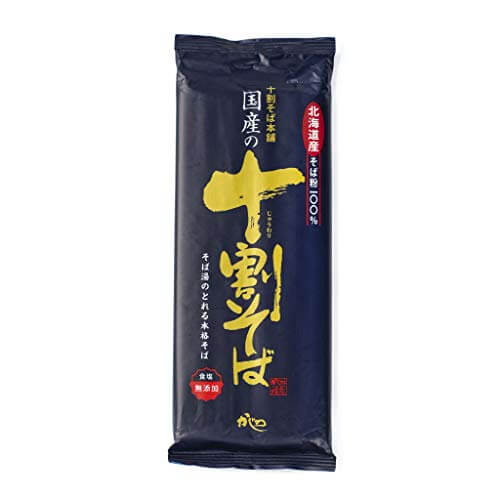
It’s highly likely you haven’t had juwari soba unless you’ve:
- eaten it in Japan
- have a well-stocked japanese grocery
- you’ve made it yourself!
Most people don’t know the majority of soba sold in stores is made with mostly wheat, and less buckwheat. (Next time you have a package, just look at the ingredients… always listed in order from greatest to least.)
One of the reasons wheat is added to soba is that it helps to add stability to the noodles.
Since buckwheat has no gluten, 100% buckwheat noodles can break apart easily.
Wheat and it’s natural gluten content help fix that problem.
Wheat pairs well with soba because it not only helps stabilize the structure of noodles, but it’s also mild in flavor.
Therefore, any wheat added to the noodle usually won’t overpower the strong flavor of buckwheat.
Wheat based soba is one of the most commonly found types of soba noodles at your local grocery store.
Therefore, the flavor, texture and nutritional content can differ quiet a bit depending on how they were made:
with mostly wheat or mostly buckwheat.
Now, don’t get me wrong. I’m not bashing wheat.
In fact, I love wheat and use it all the time in cooking (e.g. farro) and especially when baking with freshly milled flour.
So then you might be wondering…
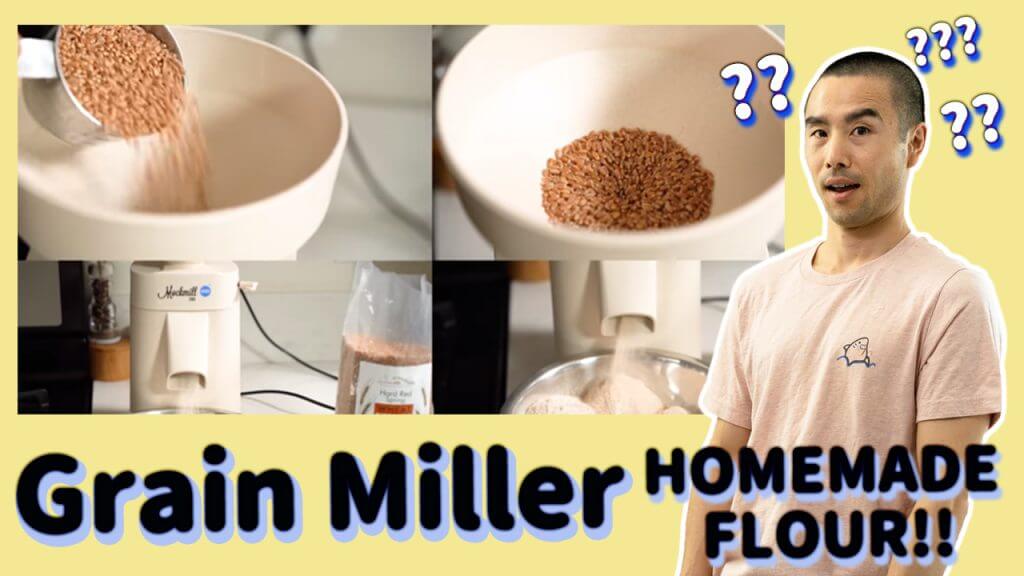
when it comes to soba, what's wrong with wheat?
I’ll tell you.
If you’ve had a chance to eat soba made with mostly buckwheat, you’d know the difference immediately.
As soon as your soba arrives in front of you, the aroma is much more intense.
Like open up those airways and take a big deep inhale through your little nostrils and be in the moment INTENSE.
And with your first bite, your teeth have jaws have a little more pressure to work against.
Getting tired of chewing?
Might need to chew more gum.
Just kidding, they’re not that chewy…
The flavor is much more pronounced.
Just like the aroma – it’ll be super earthy, nutty, bold and completely full of flavor… the way water from a waterfall would quickly overflow a small bucket.

Now when you add wheat to the equation, everything I just described will be diluted the way melted ice dilutes your drinks.
Good or bad is all relative, and some may not care.
But, if you’re a foodie who loves to eat…
then it might matter to you.
Just a little bit.
And later on you’ll see how you can experience the flavor of soba just like you’d get in Japan.
But first you might be wondering…
Is it difficult to make soba noodles?
If you ask me i’d say… Nope.
Let me ask you, what’s stopping you from trying?
Anyone can make soba noodles.
Yes – in Japan, people work and train and dedicate their entire lives to soba.
Like many food specialties in Japan, soba, tempura, kaiseki ryouri, sushi… people are extremely devoted to their craft.
That said, if that’s not you.
That’s OK!
You can still achieve a level of personal satisfaction just from trying.
And if you’ve made pasta before, soba really isn’t that different… (More on that later.)
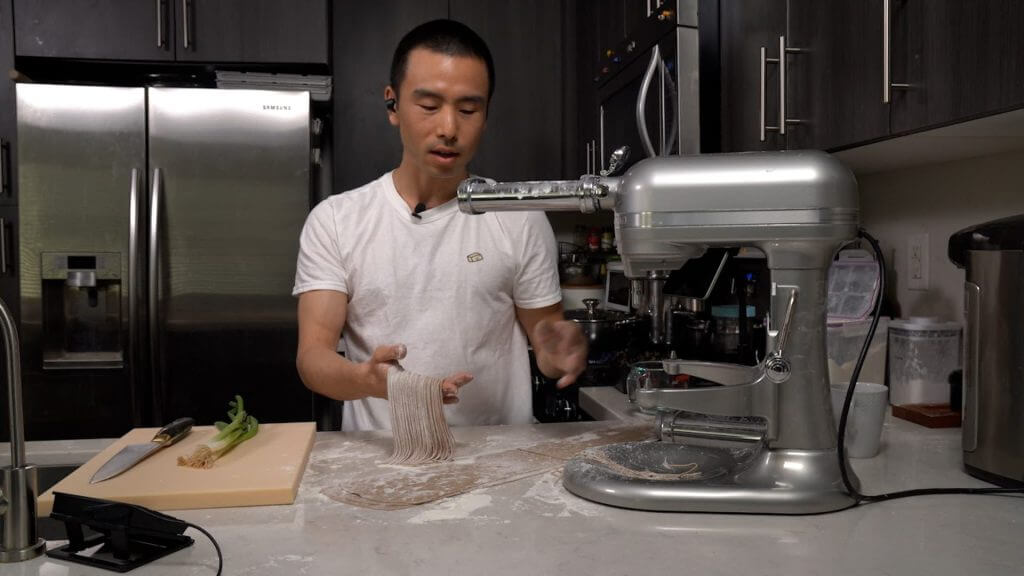
so what makes soba noodles so special then?
if you ask me-
it comes down to three things.
- their natural flavor and aroma
- their health and nutritional benefits
- their versatility- you can enjoy them in many traditional and more creative ways!
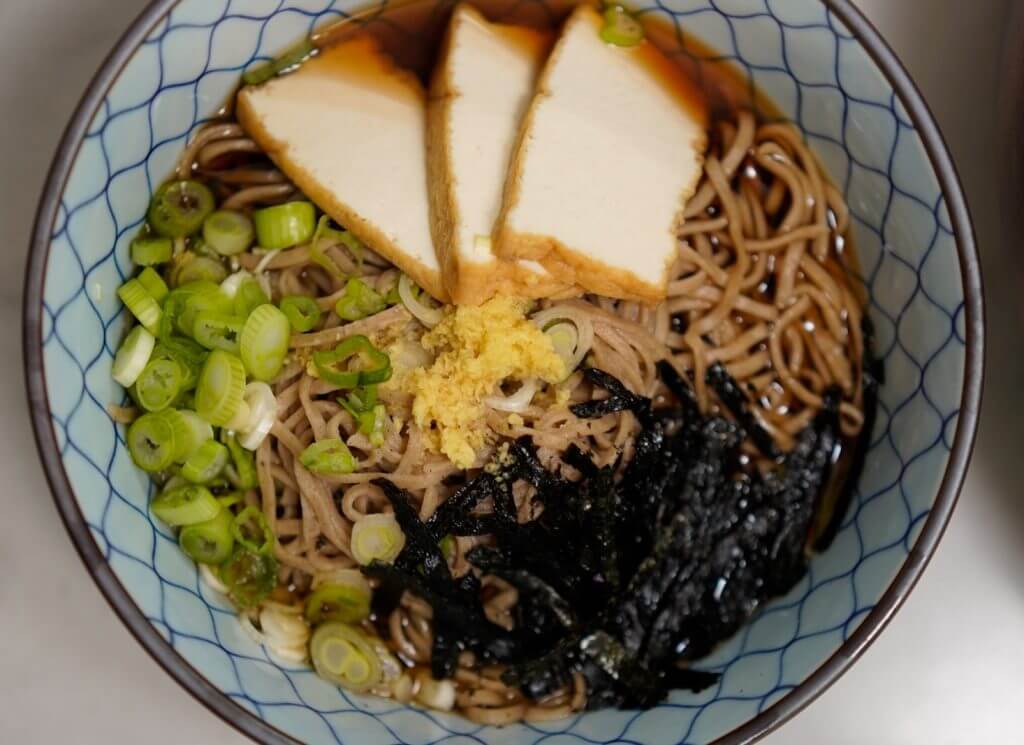
How to Find the Ingredients for soba
Sometimes your biggest barrier to getting started cooking finding the ingredients.
Let’s see what exactly you need and don’t need to get started.
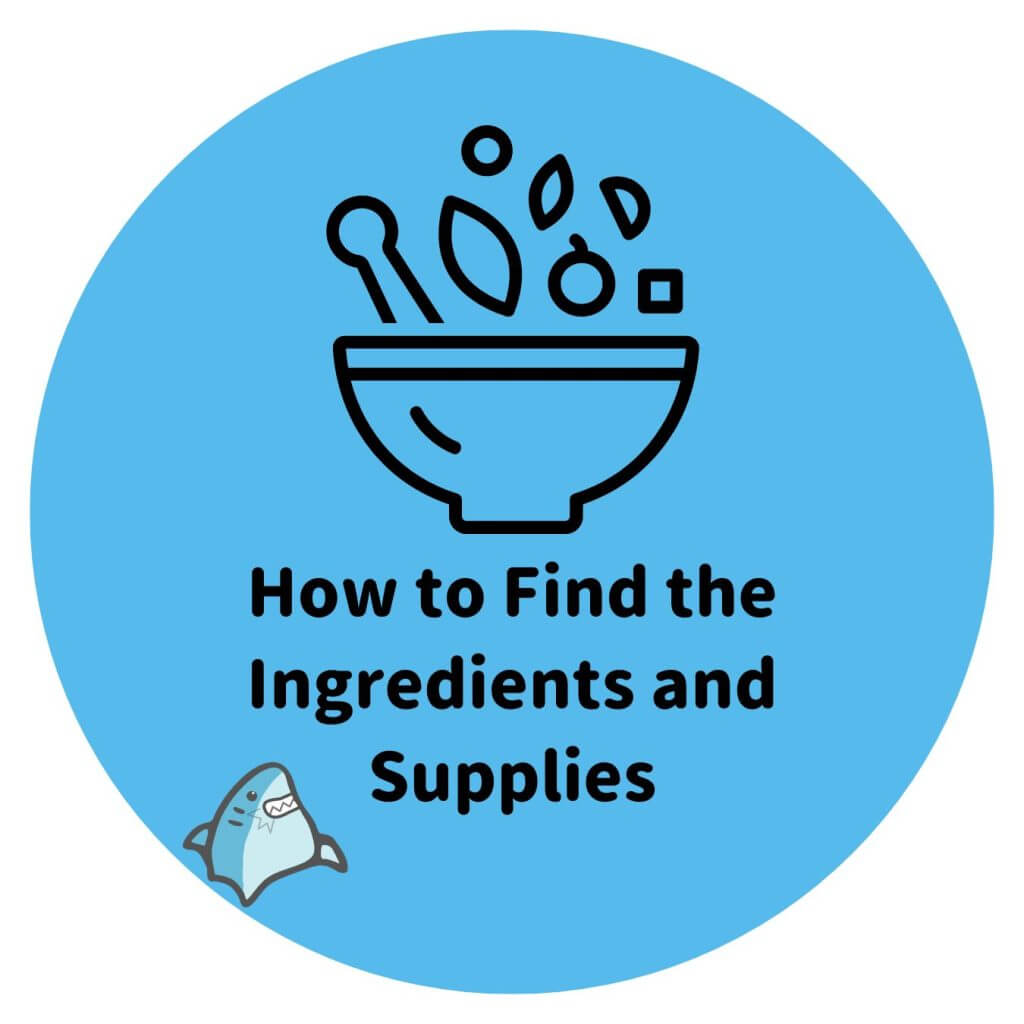
If you’re not keen on making them from scratch, you might be able to find some decent quality noodles online.
There are a few places i’ve found that sell 100% buckwheat noodles (made in Japan) that taste almost as good as these freshly made soba noodles. (Links down below)
I’d suggest if you’re going the dried noodle route, consider a few different types of artisinal looking brands. HINT: You can usually tell from the packaging and the price won’t be like 10 bundles (servings) for $8, more like $8 for 2 bundles.
But if you are interested in making them, continue reading below:
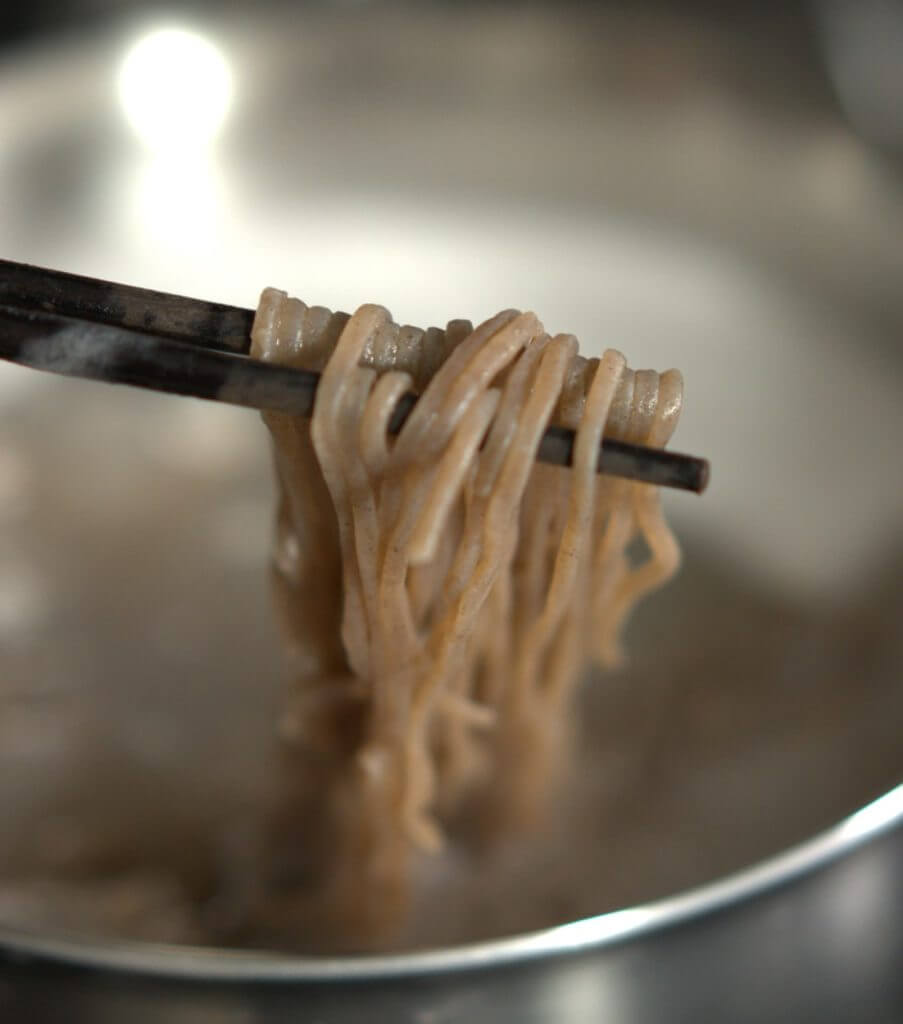
Want to make soba noodles yourself?
you don’t need much.
Just two ingredients really: soba flour (very finely milled buckwheat flour) and water.
If you’re new to making soba noodles, it’s best to start with a ratio known as ni-hachi in Japanese. Literally translated it means 2:8 or 20% wheat: 80% buckwheat in the soba world.
• Premade Ni-hachi soba flour is (sold by Anson mills) OR soba flour plus all-purpose flour or bread flour in an 80% to 20% ratio by weight
• Water
Notes:
1. Store bought buckwheat flour might not be milled to the fineness you’d want for soba, so use at your own risk.
2. if you’ve got a grain mill (like my beloved Mockmill 200) you could try milling buckwheat groats but that’s also at your own risk!
3. Set yourself up for success and start with soba flour. It’s easy to order online and equals peace of mind knowing you have the right ingredient….
Now that you know what the most important ingredient is, curious what equipment you’ll need to make it?
That’s next.
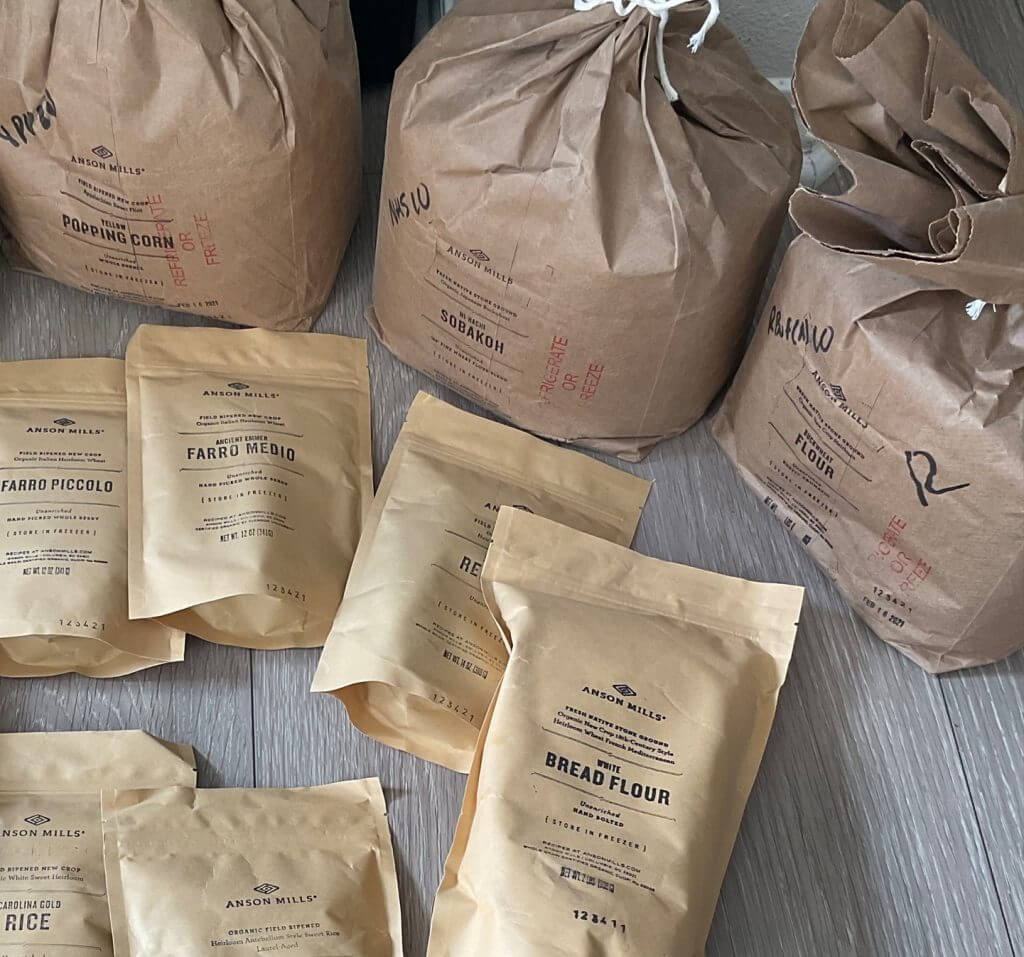
Soba Tools: Traditional and Modern
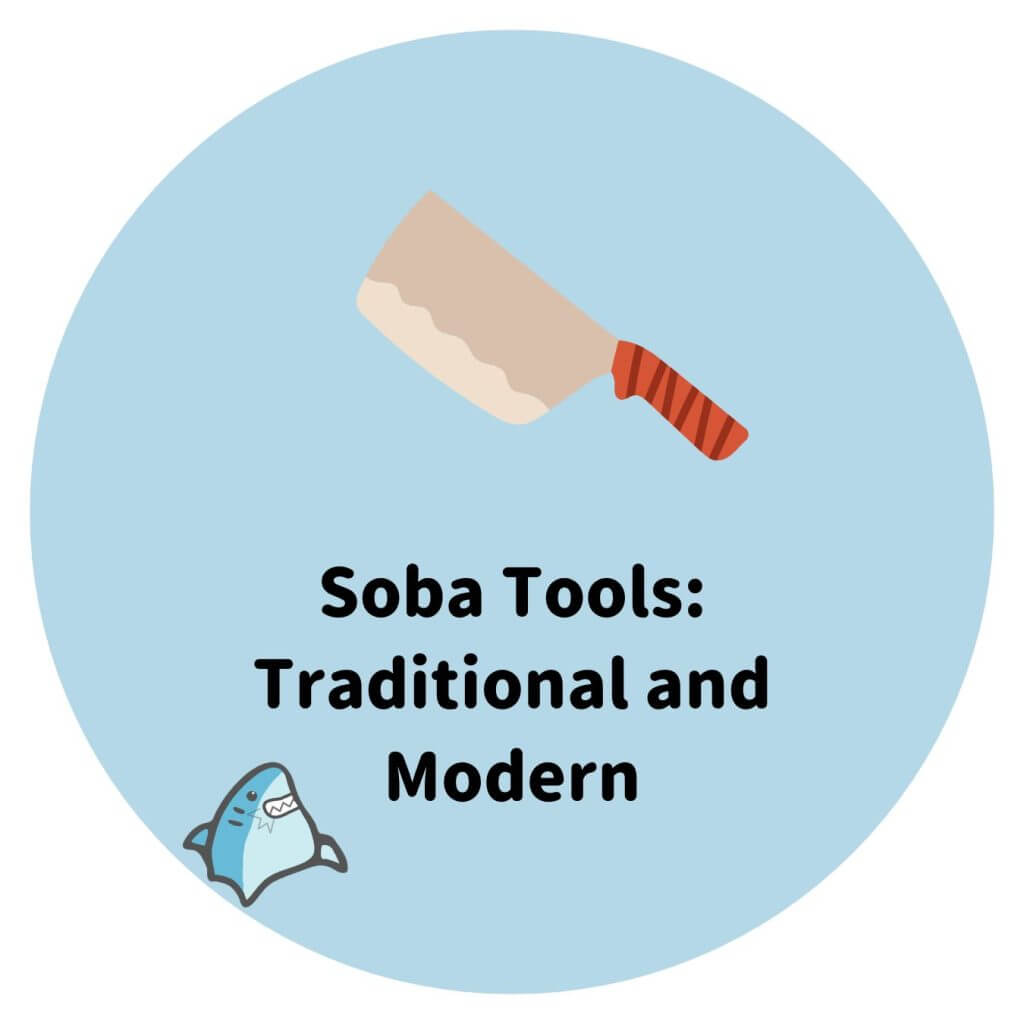
Sometimes your biggest barrier to getting started cooking finding the ingredients and equipment.
Let’s see what exactly you need and don’t need to get started.
Do you need specialized equipment to make the soba noodles?
Traditionally, several things are used to make noodles by hand.
At this point in our human evolution and with Japanese technology, you can correctly assume soba noodles are now made by machine.
Do they taste and feel different?
You’d have to do a blind taste test and see for your self.
Nope!
You can make soba with just a mixing bowl, a rolling pin, and your upper arm strength.
In my soba workshop I demonstrate how to make it two ways.
One with all the traditional equipment.
And two, with a modern Kitchenaid standmixer.
If you’re really not trying to add buy any new kitchen equipment, you could probably even get away with just a chef knife, mixing bowl and rolling pin.
But that’s just making things more difficult than necessary.
Isn’t it?
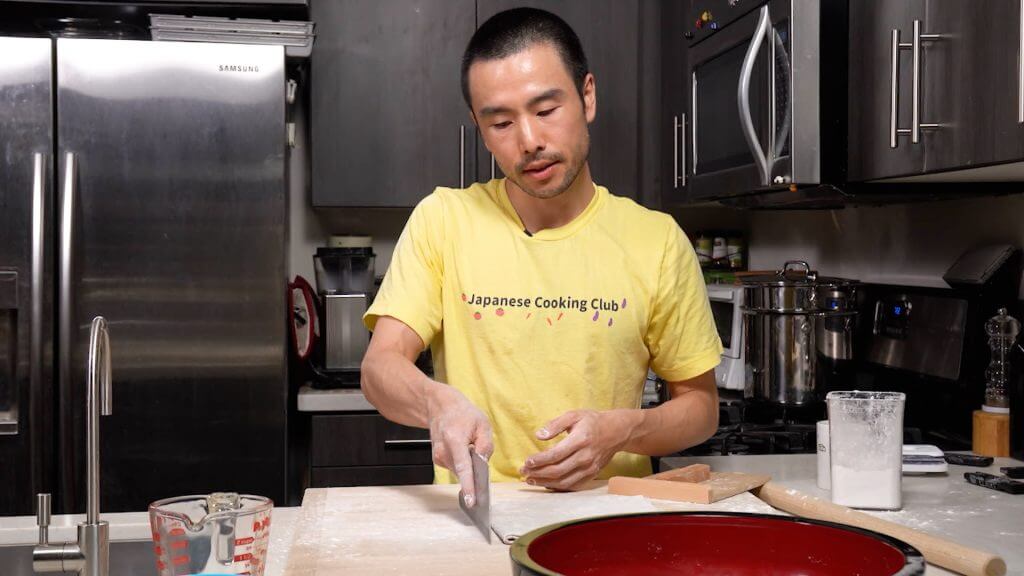
How to make soba noodles
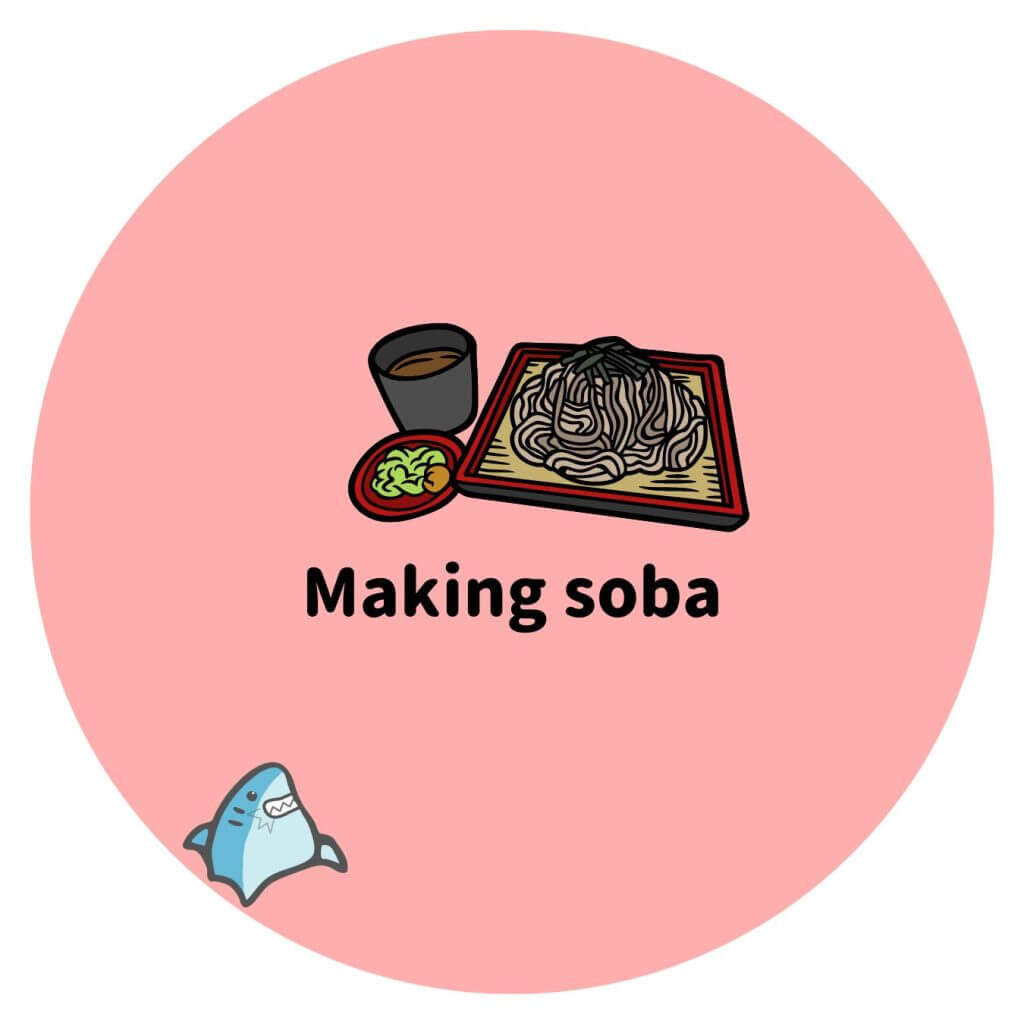
In this section, we’ll go step by step to describe how to make soba noodles – first the traditional way, then the modern way.
By the end of this section, you’ll have a good idea of what it takes to make soba noodles – from scratch.
Weigh your ingredients
A kitchen scale is your best friend. If you don’t have one, here’s three reasons to get one:
1. Consistency – eliminate one or multiple sources of variability in your methods to get you the same results each and every time
2. Precision – know exactly how much of each ingredient you’re using
3. Versatility – use for baking and other cooking needs.
Back to soba
When I make soba, I like to use 500grams of total flour per batch.
This is usually enough to feed 4-6 people depending on how generous you are when serving.
If making the ni-hachi flour from sobako and your own all-purpose or bread flour, measure 400g soba flour and 100g the respective wheat flour.
You’ll also want to measure out 250g water.
Once your flour is weighed out, use a sift or fine wire mesh strainer to sift the flour into a large mixing bowl.
Tip: sifting helps to eliminate clumps and ensure even mixing when you add the water.
As you become familiar with the texture and consistency when working with the soba, you can experiment with different ratios as you desire. Increasing the buckwheat portion more or less to your taste.
When you add the water you’re going to do it in batches.
Mizumawashi ( 水回しRounding water)
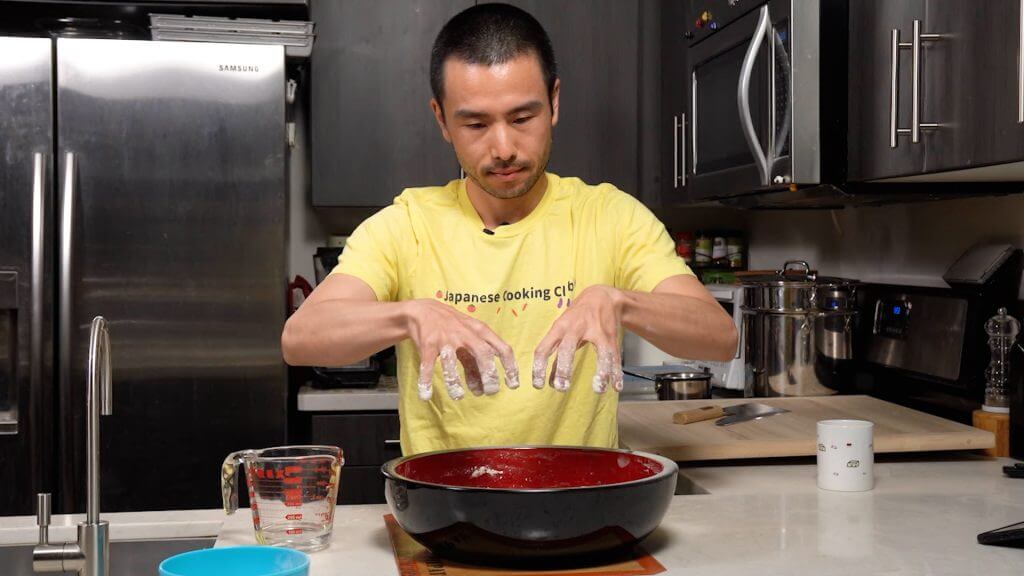
This is one of the first steps to making soba the traditional way, by hand.
You want to add water in 3-4 batches because it helps the soba flour evenly absorb the moisture.
After you add the water you’ll be mixing it in between each addition with your fingers spread apart like cats claws.
Add half the quantity each time.
For example: Since we start with 250g water, first add 125g, next 60g, next 30g, next 15g.
It’s ok to have a little water left over.
As you mix the dough, the particles of dough will form larger and larger pieces going from ‘panko’ (Japanese bread crumbs) to azuki (Japanese red bean) and finally soramame (broad beans) to finally cherry tomatoes before you can knead it into one large piece.
Once the water is almost gone, the soba ‘dough should look nice and smooth.
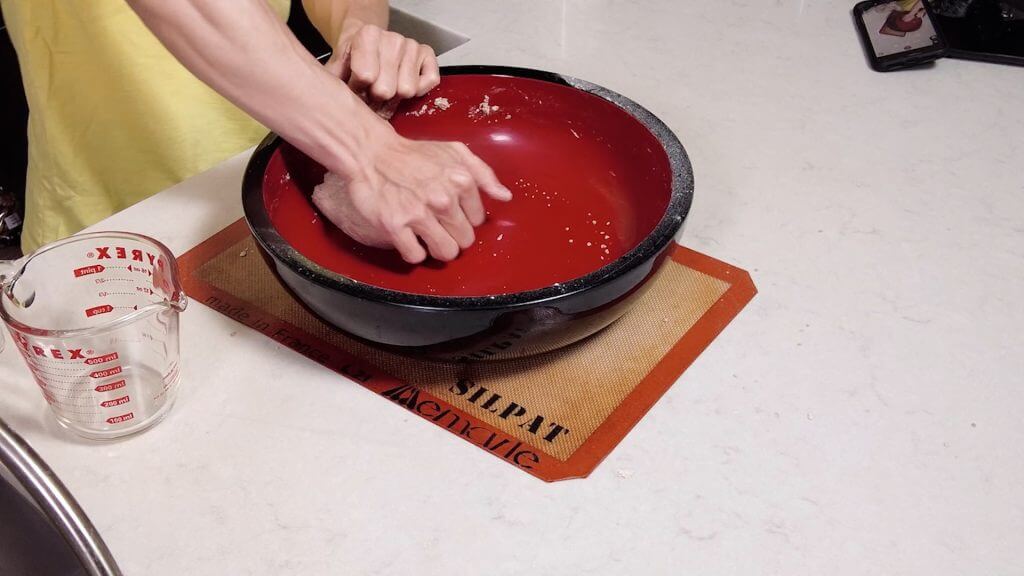
Once you’ve created your soba dough ball you’re going to knead it a little to help develop some strength in the dough.
As you knead the dough, you’re going to need to use all the body weight you can to push the dough.
The more force you can apply with your body, the easier it’ll be on your arms.
As you continue to knead, you’ll notice it’ll become smoother in appearance.
After 4-5 minutes of kneading you’ll notice that there aren’t anymore large cracks or fissures in the dough.
When the surface of the dough is smooth, you can gently press it into a disc and you’re done kneading.
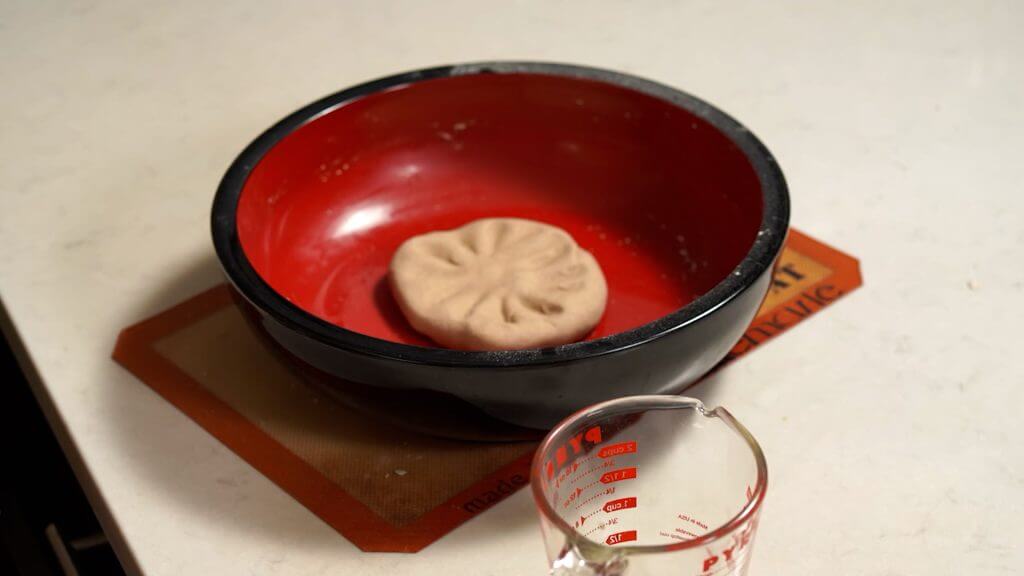
Kukuri (くくりmaking a chrysanthemum)
Next you’ll take the disc and stand so the flat side is facing you.
You’ll push down and away to flatten and rotate slightly each time.
With the palm of your hand and use your thumb and palm to gently indent the surface of the flattened cone while rotating it.
This makes the dough more uniform and look like a kiku or chrysanthemum. (Just like some of the merch in the shark shop)
The next 8 steps
At this point there are 8 distinct steps you’ll follow to prepare the dough to be cut. I’ve listed them below with the loose translations for which you can use your imagination for what they entail:
- Kagamidashi (鏡出しpushing out mirror)
- Marudashi (丸出しmaking it round)
- Kakudashi (角出しmaking it square)
- Nikuwake (肉分けremoving the meat)
- Habadashi (幅出しwidening out)
- Honnoshi (本延しtrue extension)
- Tatami (たたみ flattening)
Imagination aside, in summary:
the soba dough will be rolled out from it’s current state which is round – into a square shape that is easier to cut for noodles.
As you roll out the four corners of the dough, you’ll simultaneously push down to flatten and thin the dough. This will lead to the final thickness of each noodle.
Last, you’ll fold the dough onto its self like a square blanket folded in half, and half again into a quarter of the size it was originally.
Still with me?
Good!
it’s all down hill from here 🙂
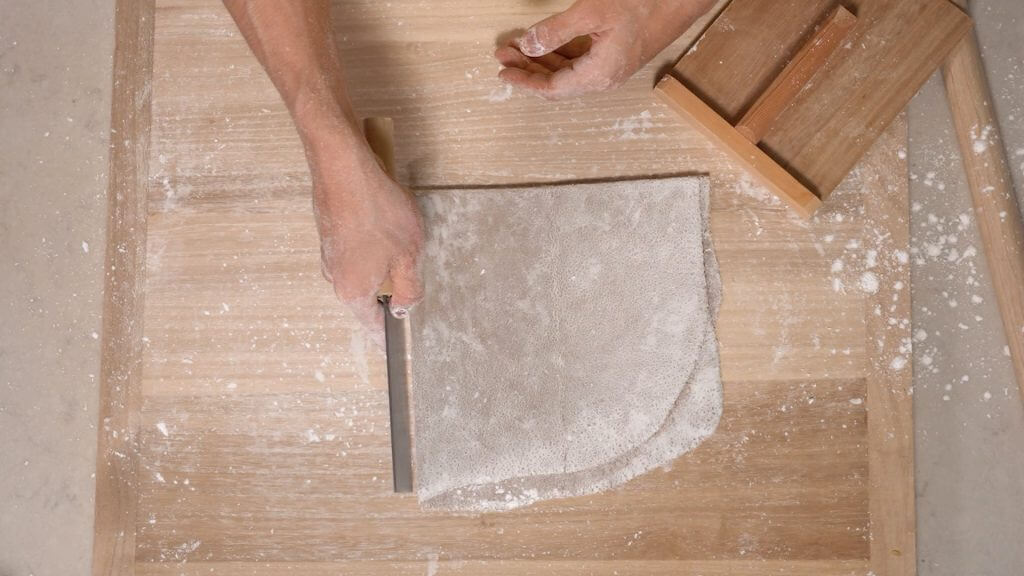
Cutting the soba noodles
With your soba knife and soba cutting guide, you’ll press down firmly and away at a 45 degree angle. Moving the cutting guide a few mm at a time until all the noodles are cut.
You’ll then dust them with buckwheat or wheat flour to prevent sticking and if not using right away, covered in an air tight container to prevent them from drying out.
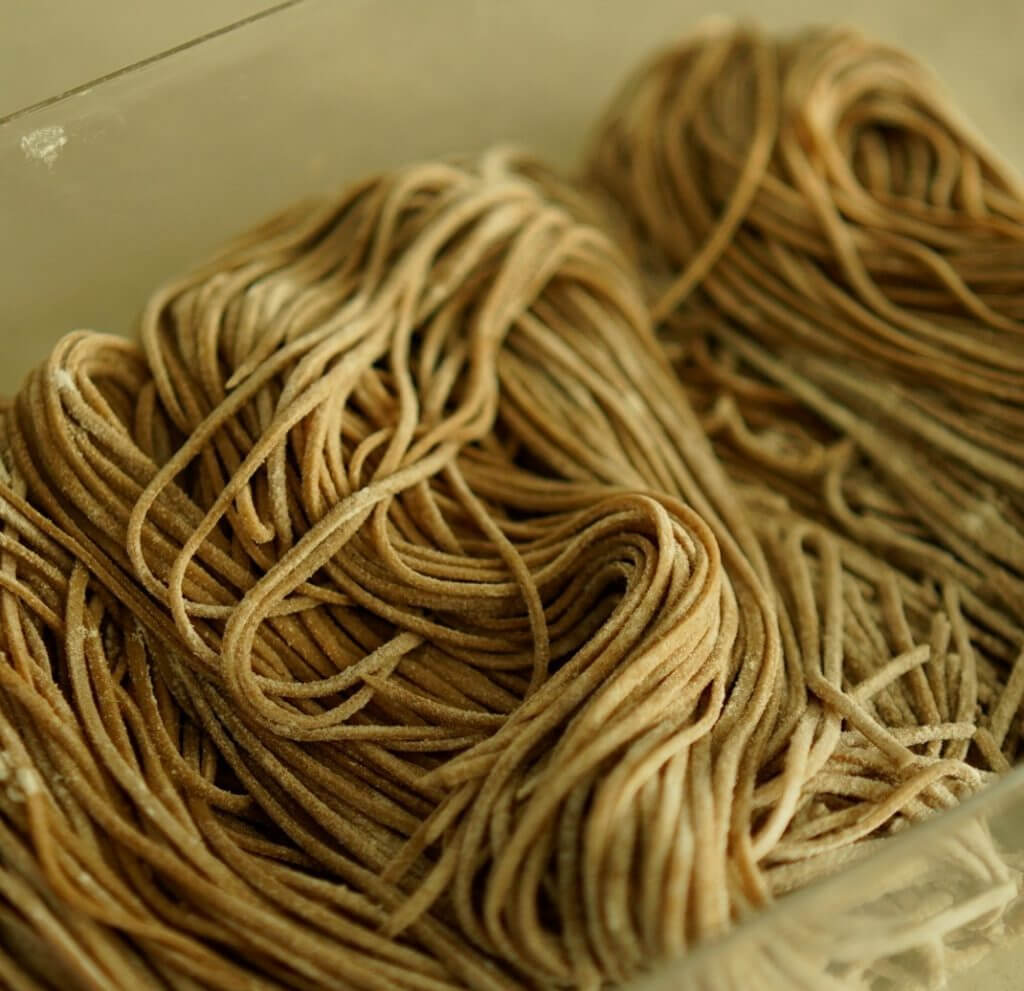
Making soba with a stand mixer
So now that you’ve gone through the traditional method of making the noodles, here’s the modern method.
It yields equally delicious results that is sure to impress, just like the hand made version.
In 3-5 steps here’s what you’d do:
1. gradually mix the flour and water in the same method, using batches of water and your beater attachment.
2. as the dough becomes one large piece, switch to the kneading hook and knead.
3a. after the dough becomes smooth, use the pasta extruder and spaghetti cutter to extrude the soba.
3b. if using the pasta roller attachment, roll the dough several times getting progressively thinner each time. (I usually go to 3-4 on the roller.) Note: It does help to divide the dough into 4 pieces because it’s easier to work with smaller pieces of dough.
4. after rolling, it needs to be cut and i use the spaghetti cutter.
5. after cutting, dust with buckwheat or wheat flour to prevent sticking and store airtight if not using immediately.
(and yes you can even use the kitchen aid pasta extruder attachment, pictured below – but it does take a reeeely long time! )
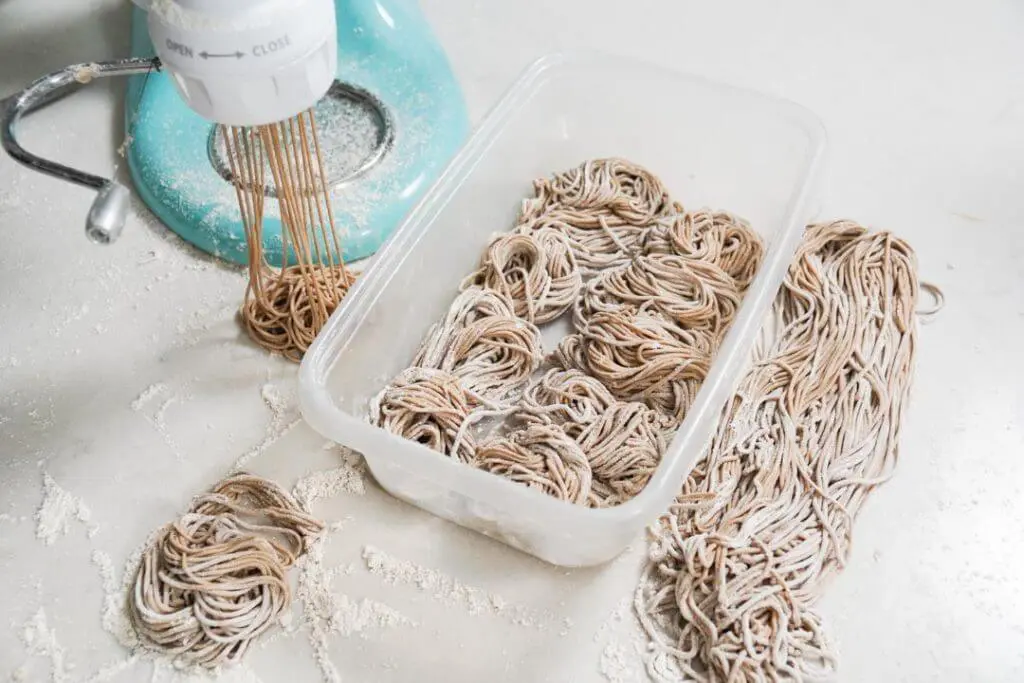
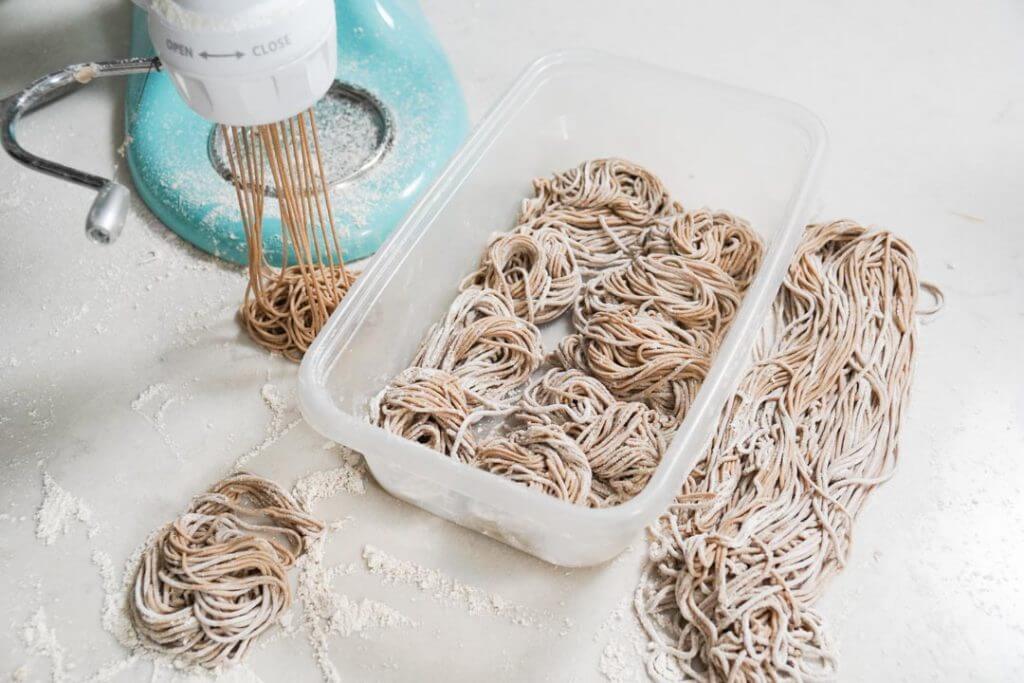
Cooking the soba noodles
Like fresh pasta, fresh soba noodles cook very quickly. (If using dried, follow package directions)
After you drop the freshly made soba noodles in boiling (and unsalted!) water, give them a gentle swirl to ensure none are sticking together.
You’ll notice when they begin to float (roughly after 1 minute.)That means they’re done and you need to drain them.
To stop the cooking, you’ll also rinse under cool water and set in an ice water bath.
A few tips for cooking your soba noodles:
- Use a lot of water, for the 500g batch try for a minimum of 12 cups of water
- salt is unnecessary and not used in Japan for soba. please don’t add it. soba has plenty of flavor without it.
- stir at the beginning and leave alone
- test for doneness if you’re not sure
- when done, rinse and cool in an ice bath to stop cooking
- keep covered if not using right away

Sobayu (soba cooking water)
Don’t throw out that soba noodle cooking liquid. In traditional soba restaurants in Japan, you might have the opportunity to enjoy the cooking water at the end of your meal.
It’s extremely satisfying, as it’s thick from the dissolved buckwheat and rich with flavor and nutrients.
You can enjoy this too when you make soba at home.
If your water is a little thin, consider reducing it until it’s almost like whole milk in consistency.
You can then use it in a variety of ways:
- at the end of the meal, add your leftover dipping sauce and enjoy as a savory way to end the meal
- for smoothies when you want something dairy free
- for granola like you would your favorite smoothie bowl
- sweetened with your favorite sweetener
- with quinoa or oats for flavorful breakfast porridge
How to serve soba noodles
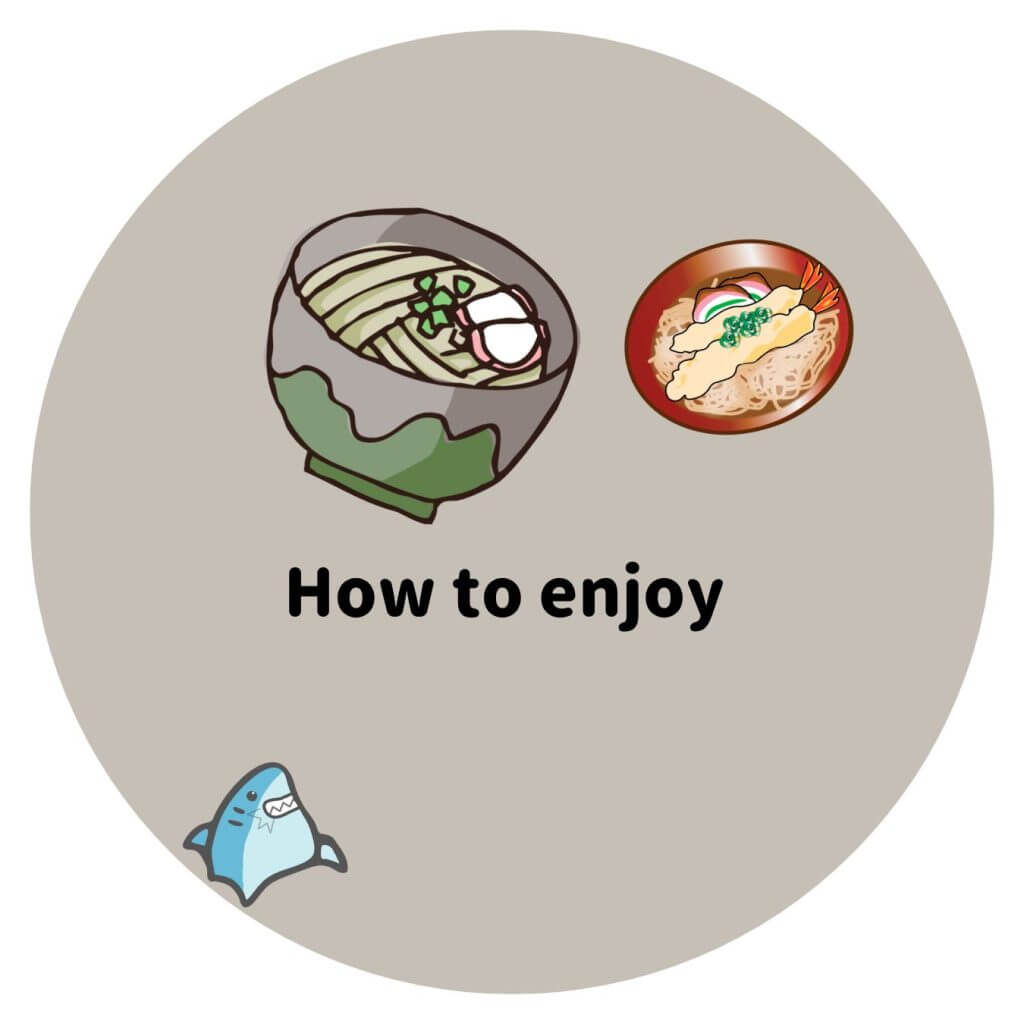
In this section, you’ll discover some of the traditional Japanese ways you can enjoy soba noodles.
The best part is that you can enjoy them year round, in the middle of a cold winter or heat of a blazing summer. Your choice.
There are many different ways to season soba noodles and in this section you’ll discover some of the more common:
First, let’s talk about mentsuyu (noodle soup base). Mentsuyu is probably the most common method of enjoying noodles at home.
As you might imagine, it’s used to season Japanese noodles. And not just soba, but even vegetables and other dishes too.
Mentsuyu can be found in bottles at the Japanese grocery store usually by the soy sauce section. Mentsuyu usually comes premade as a concentrate.
All you gotta do is dilute with water before using.
Though it’s convenient to use, if you enjoy the best flavors life has to offer, you might want to make it from scratch.
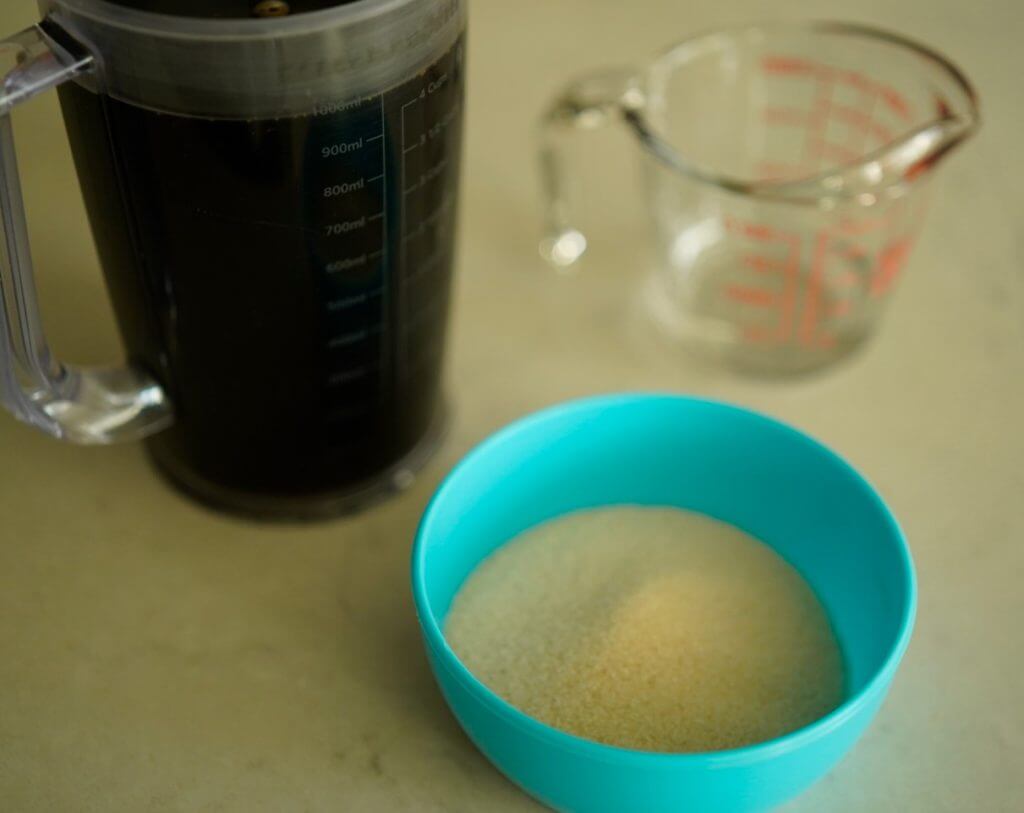
Kaeshi
Kaeshi is a concentrated seasoning that is the base of a good soba seasoning – for soup or dipping.
It’s pretty simple to make. All you need are a handful of ingredients:
- Japanese soy sauce
- Mirin and or Sake
- Sugar
Once you have your kaeshi, you’d dilute it with dashi to make your soup or dipping sauce.
Just like in Japan!
Yakumi - Toppings
these are mostly aromatics. you can use things like green onions, grated daikon, radish, daikon radish sprouts, grated ginger and freshly grated wasabi.
If you like things spicy, get ichimi (一味 one flavor) red pepper or shichimi (七味seven flavor) red pepper
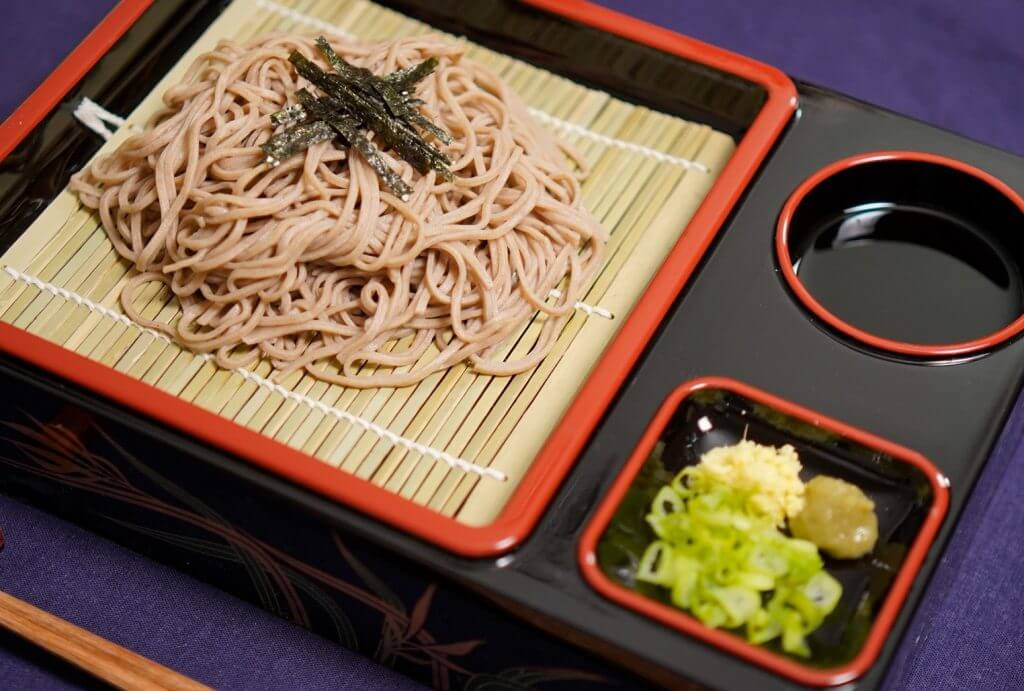



Konnichiwa! (Hello!) I'm Pat Tokuyama, a Japanese tofu cookbook author, who travels for music, food, and adventure. If you like Japanese tea, checkout some of the newestorganic japanese tea, matcha bowls and noren and more!
** Curious about the Plant Based Japanese Cooking Club? ** Learn more here!
Traditional ways soba is served
In the heat summer, you might enjoy soba served cold: as zaru (strained) or seiro (steamed) soba with a concentrated dipping sauce.
In the cold of winter, kakesoba (broth poured over soba) might be the perfect way to keep warm.
If you throw a fried tofu pouch on top, that makes it a kitsune soba, translated from Japanese ‘fox soba’ – from the brown gold color of the tofu pouch.
If you have access to yamaimo (mountain yam), it’s delicious to grate and enjoy with both hot and cold soba for a unique slimy flavor and texture.
If you enjoy the flavor of walnut and sesame, you could enjoy kurumi soba – a regional specialty from Nagano. This soba features a richly flavored walnut-sesame sauce unlike anything you’ve ever had before.
Either way, when you make soba noodles at home, you might soon be wondering what took you so long!
And maybe even a feeling of accomplishment and personal satisfaction.
Oh yes oh yes!
Tips and techniques to help you enjoy soba at home
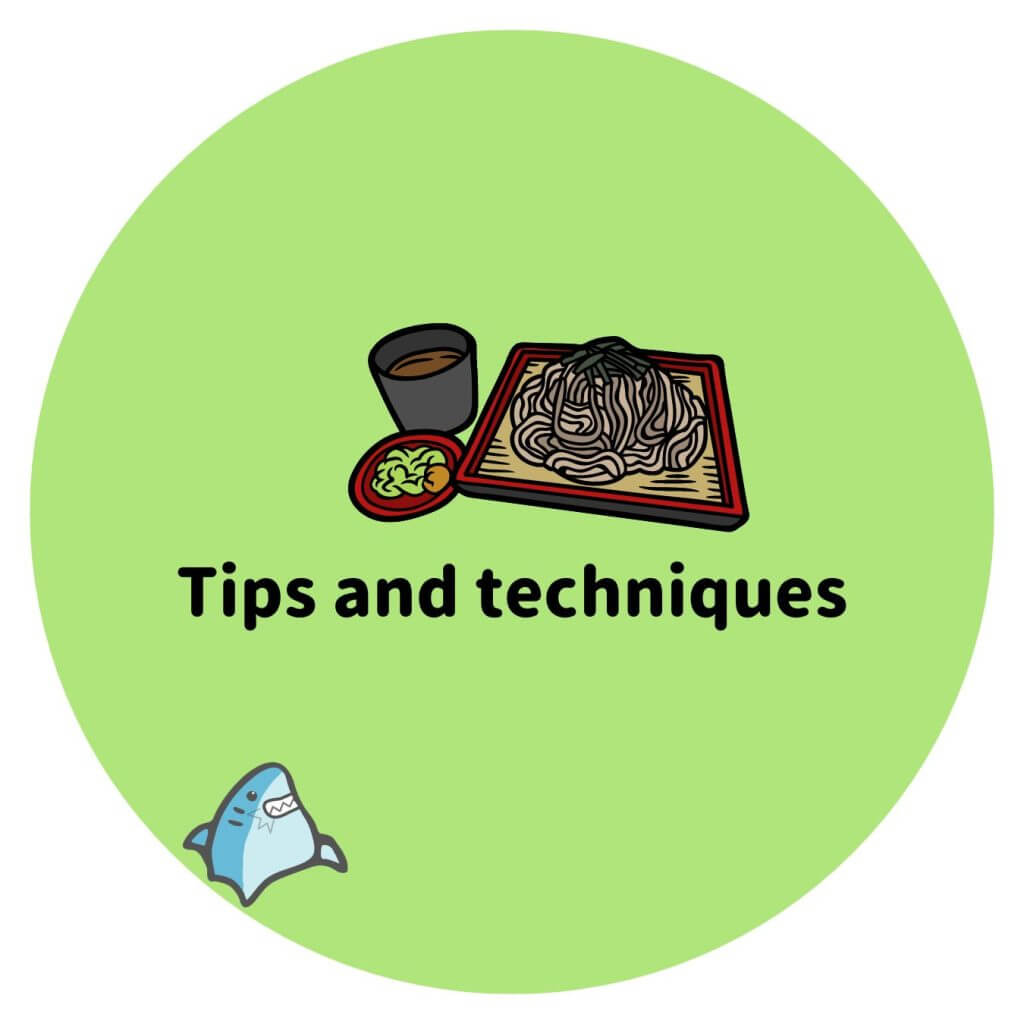
Now you know what soba is, how to make it, and how it’s traditionally enjoyed…
You might be wondering how you can make it a sure-fire success!
In this chapter, you’ll discover what you can do to make soba a routine part of your life.
1. Weigh everything. To reproduce your results each time, nothing is more accurate than weighing your ingredients with a scale.
2. Sift your flours. As you may know flour tends to clump, and we want as even of a mix as possible. This helps the flour to absorb water evenly as we mix.
3. Be conservative with the water. Depending on how fresh your flours are and how dry your climate is, you may need a little more or a little less. As you continue to work with soba flour you’ll get a feel for how much water you need, you can always add more but you cant take it out once it’s in! it’s ok to have just a little bit left over.
4. Work quickly. Soba dough can dry out which may affect the noodles, making them brittle by the time you’re ready to cut or boil them. This is especially the case with higher ratio of soba flour (buckwheat). If not using the fresh noodles immediately, cover airtight.
5. Save your soba boiling water (soba yu蕎麦湯) you can save this and reuse in many different ways.もったいないしないように Mottainai shinai youni! (try not to be wasteful!)
6. Store dusted noodles in small bundles. Usually 100-120g is considered a serving for one person. You can separate bundles with a paper towel or parchment to help give them space and prevent clumping. (Plastic wrap is not recommended)
7. Refrigerate and use within 3 days for best flavor and texture. (During that time discoloration will occur but is natural)
8. Pick the method that works best for you: dried noodles, the traditional way or using modern appliances. The end results are pretty close!
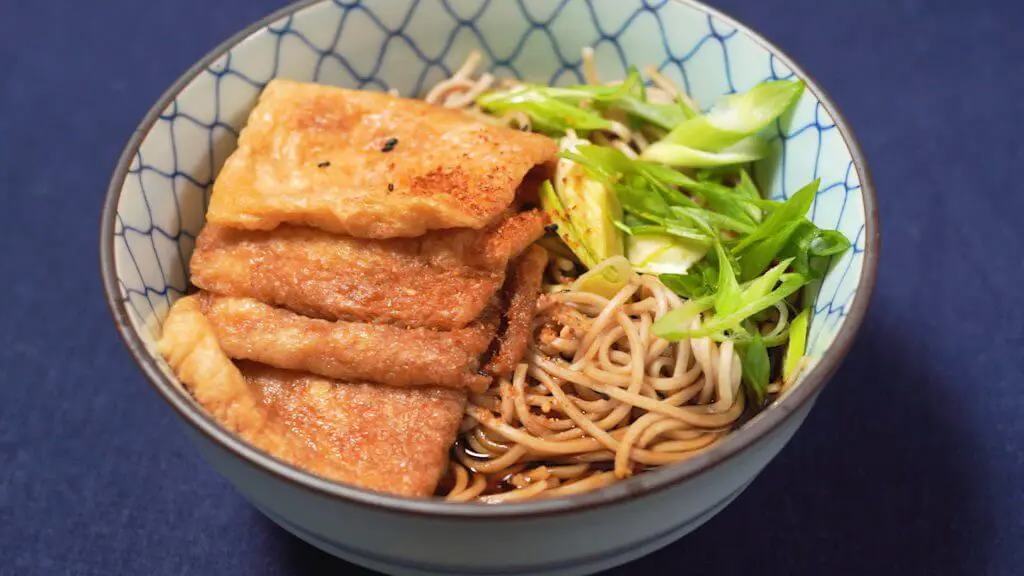
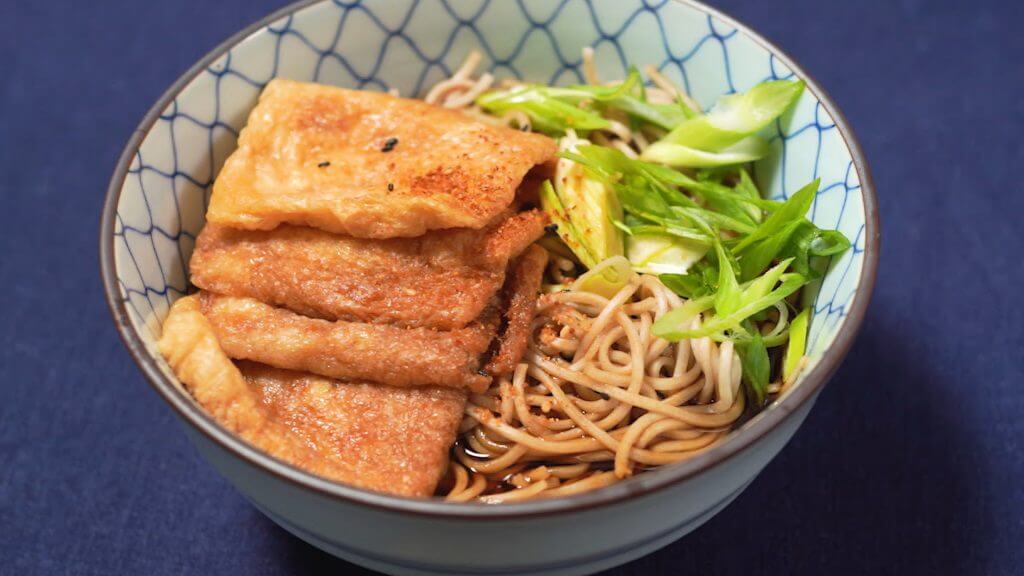
Frequently asked questions about soba

A lot of people have questions about soba, you may too.
Here’s a few of the most common questions I’ve received from people who considered and already joined my soba cooking workshop.
What does soba mean in Japanese?
Soba (そば or 蕎麦) is the japanese word for both buckwheat and the buckwheat noodle.
How is soba traditionally served?
Usually this is a stand alone meal that can come with a few toppings and or side(s) of vegetables.
What is soba broth made of?
Soba broth can be made in many different ways.
Traditionally, it consists of just two ingredients: dashi and kaeshi (a bold concentrated seasoning for soba.)
Different regions of Japan use different ingredients for their dashi, often resulting in unique and characteristic flavors particular to that region.
Kaeshi can be made from sake, mirin, sugar and soy sauce. Like mentsuyu, this seasoning can be used in other ways aside from making soba broth.
Alternatively, you can use mentsuyu (noodle soup base) to quickly make the soup without dashi or kaeshi.
Is soba healthier than Udon?
Compared to udon, buckwheat is lower in carbohydrates and thanks to it’s natural fiber and protein content less likely to make you feel bloated or result in a food-coma after eating.
Is soba healthier than ramen?
As far as Japanese noodles go, soba noodles are some of the healthiest options out there.
Unlike ramen noodles, which may contain oil, fat and much more salt in the seasoning, soba noodles are low in fat and cholesterol, provide fiber, protein, and call for more vegetable pairings than ramen.
What is the difference between soba and yakisoba?
Yakisoba (焼きそば) is a a Japanese stir-fried noodle dish.
It often includes a variety of different vegetables and proteins.
Usually, chukasoba (Chinese noodles) that is wheat based is used for this dish.
The seasonings can vary from salt, to curry and others as well.
Why do Japanese eat soba on New Years Eve?
The tradition is believed to have started around the Edo period (1603-1867).
Buckwheat plants are extremely hardy and can survive severe weather conditions with both heat and cold. So symbolically, soba embodies strength and resilience.
New Year’s is a major holiday in Japan, and eating soba is a well-established tradition that’s said to bring good luck in the coming year.
On New Years Eve, the dish is called toshikoshi soba (literally “year-crossing soba”) with long noodles symbolizing a long life ahead.
Where can I find the ingredients and additional training?
Click here for a quick resource on the supplies i recommend for making soba at home.
if you’d like to get additional guidance in making them, join my virtual soba workshop for step by step video instruction and more!
Conclusion
So there’s my definitive guide to Japanese soba noodles.
Now i’m gonna turn it over to you: If you were to make soba noodles, which method would you try first ?
Are you more old school or more inclined to use modern technology?
Let me know with a quick comment below right now with ‘traditional’ or ‘modern’!




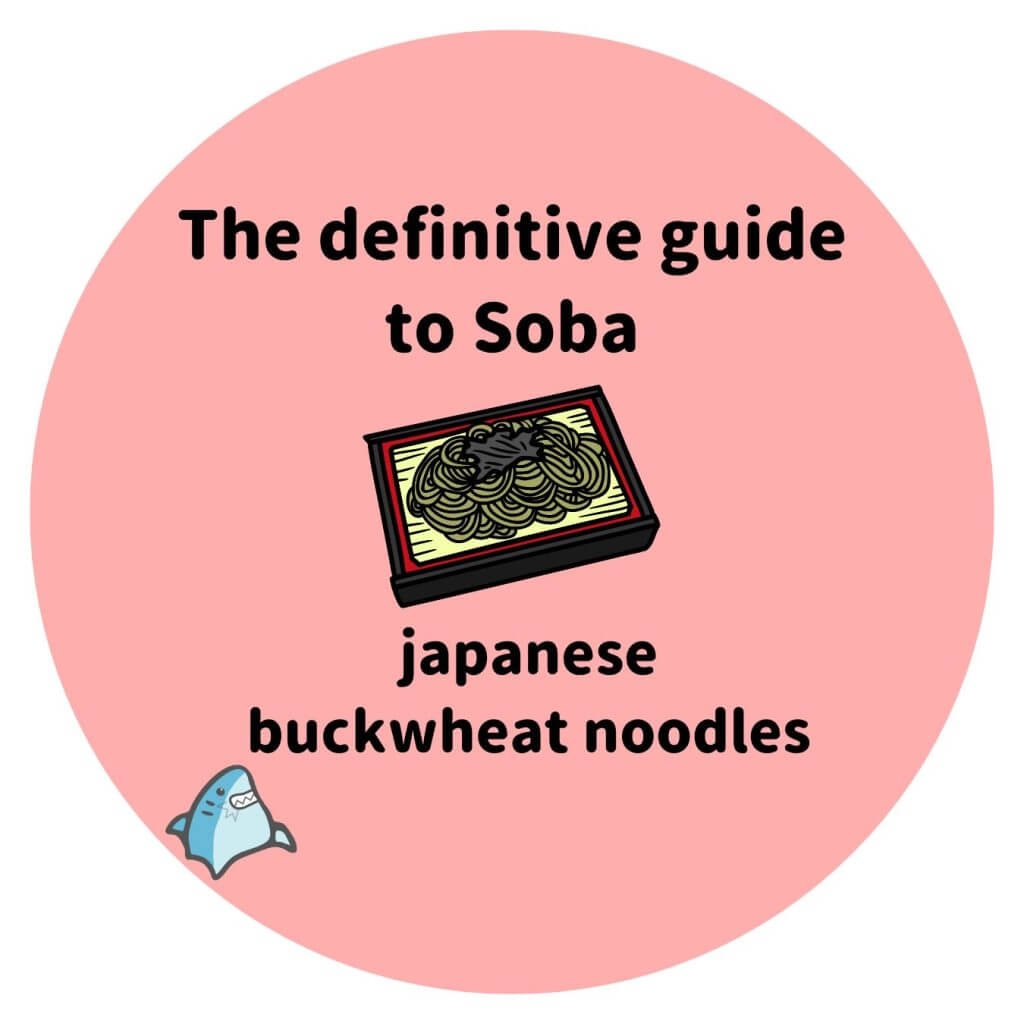


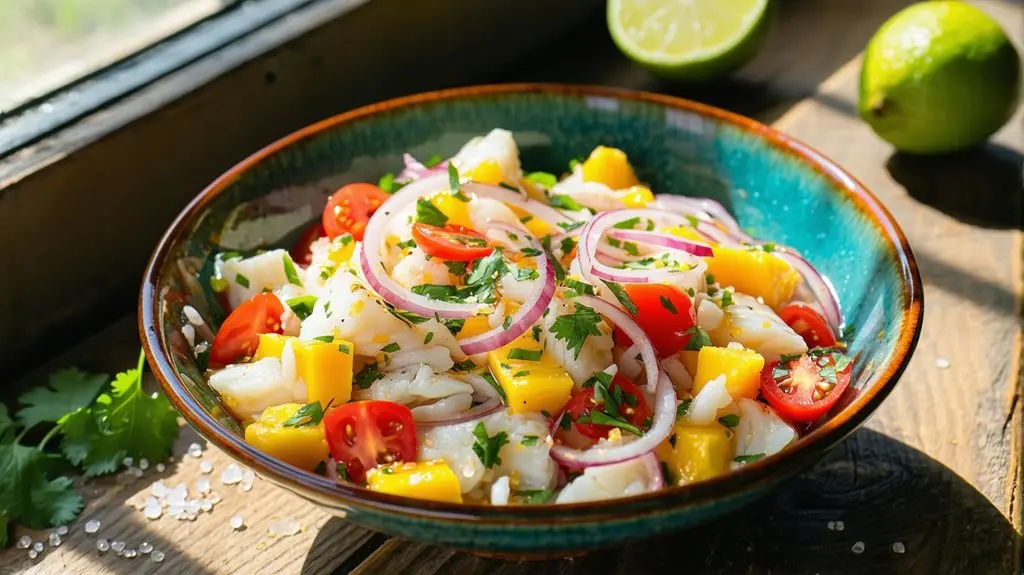
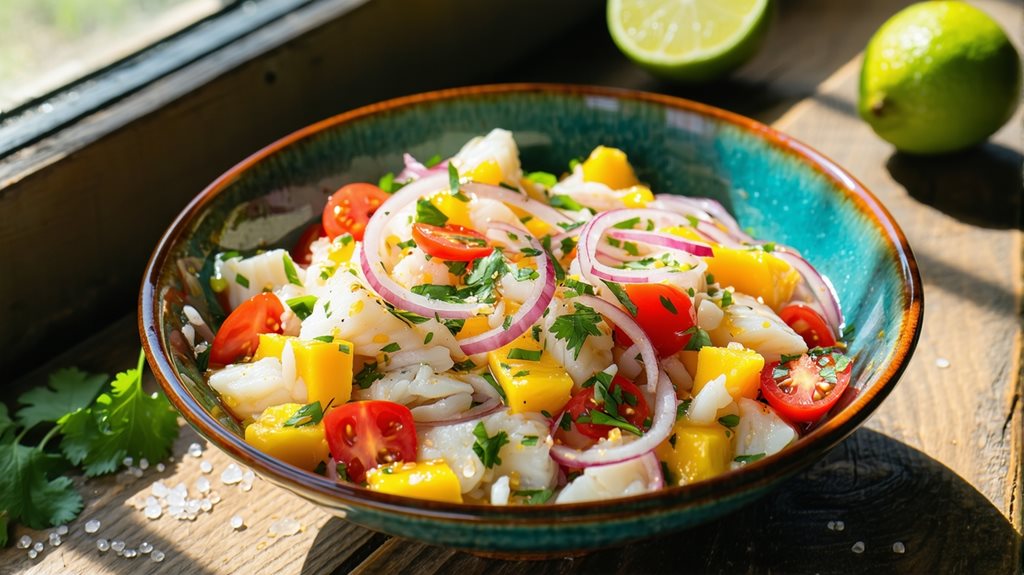
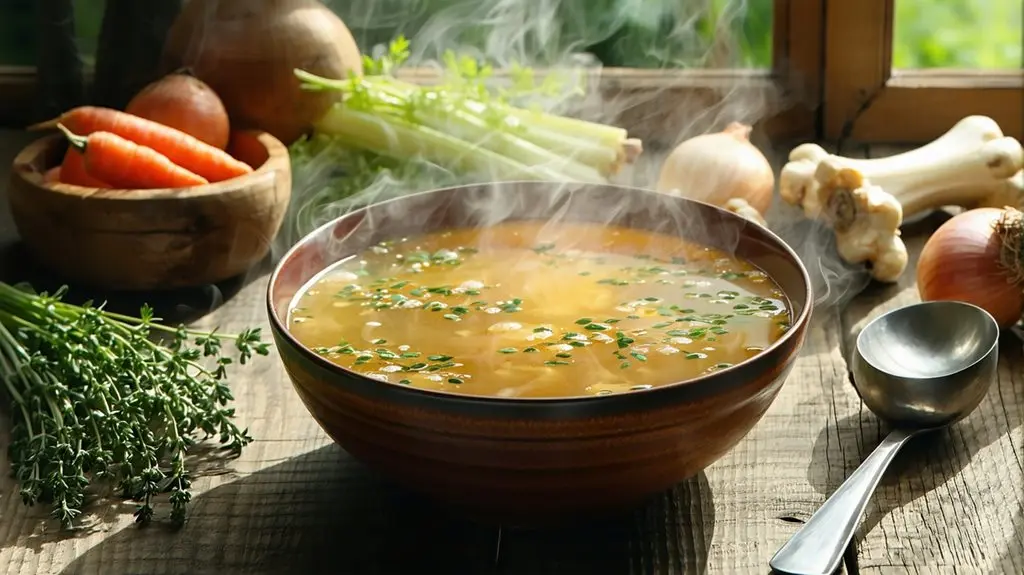
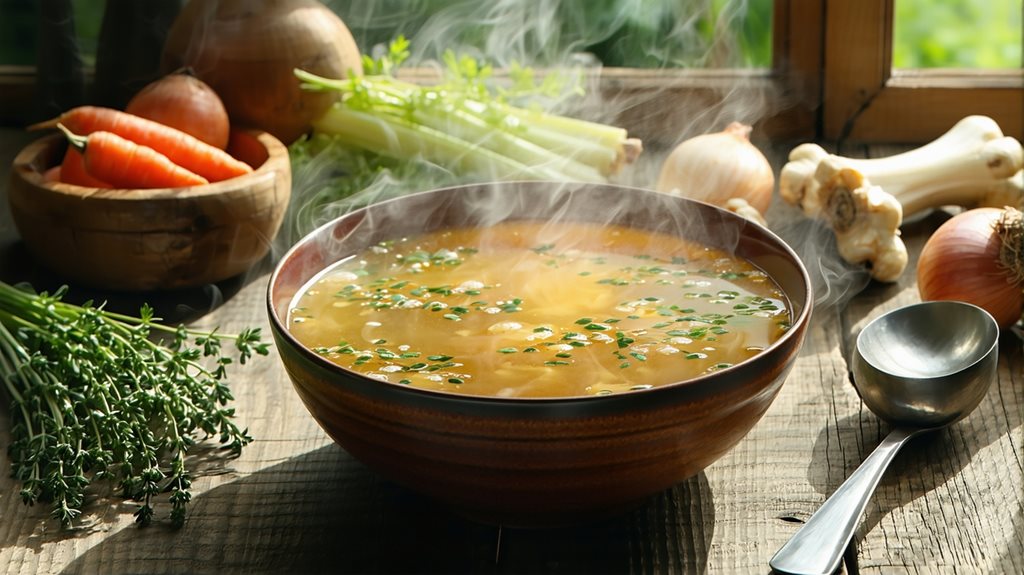
Konnichiwa! (Hello!) I'm Pat Tokuyama, a Japanese tofu cookbook author, who travels for music, food, and adventure. If you like Japanese tea, checkout some of the newestorganic japanese tea, matcha bowls and noren and more!
** Curious about the Plant Based Japanese Cooking Club? ** Learn more here!